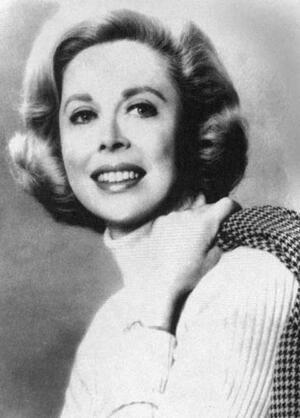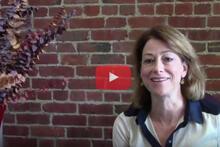Joyce Brothers
Joyce Brothers earned her doctorate in psychology in 1953. Two years later she appeared on the popular television show The $64,000 Question – she became an instant favorite due to her expertise in boxing, which she had acquired to please her husband. After seven weeks on the show she became the second person and only woman to win the top prize. In 1958, NBC offered Brothers her own afternoon talk show, which was another huge success; she offered advice to viewers on child rearing, love, marriage, and sex. On her late-night show, she became one of the first celebrities to openly discuss taboo subjects such as sexual satisfaction and impotence. Brothers was a contributing editor or staff writer on several journals, and a number of her books sold well.
During a public career spanning more than forty years, Dr. Joyce Brothers made the unlikely journey from housewife to celebrity quiz show contestant to the nation’s best-known media psychologist. On her first venture into television in 1955 as a contestant on The $64,000 Question, the most popular quiz show of its day, Brothers won the viewing public’s notice for her knowledge of boxing, an expertise that seemed unusual for the petite woman who also held a doctorate in psychology. Her instant celebrity led to a television show of her own, as well as radio programs and syndicated newspaper and magazine columns.
Early Life, Family & Education
Joyce Diane (Bauer) Brothers was born in New York City on October 29, 1929, into the middle-class household of Morris K. and Estelle (Rappaport) Bauer, both attorneys. Joyce and her younger sister Elaine, who also practiced law and is now a judge, grew up in Far Rockaway, Queens. She credited her parents with instilling in their daughters a desire for achievement and respect for hard work. Their Jewish faith also imparted a sense of ethics and a belief in God. At twelve years of age, she worked in a camp for disturbed children, gaining great satisfaction from helping others. After graduating from Far Rockaway High School in 1943, she entered Cornell University, majoring in psychology. She took her B.S. degree with honors in 1947, and then enrolled at Columbia University, where she did graduate work in behavior and personality. While attending Columbia, she was an assistant in psychology as well as a teaching fellow and instructor at Hunter College.
Shortly after receiving her M.A. degree on July 4, 1949, she married Milton Brothers, a medical student. She continued with research and teaching, earning a Ph.D. in 1953 with a doctoral dissertation on anxiety avoidance and escape behavior measured by the action potential in muscle. By this time, her husband had completed medical school and she was pregnant. When their only child, Lisa, was born, Brothers chose to remain at home to raise her daughter according to her own beliefs about child rearing. However, this decision reduced the couple’s income to the fifty dollars a month her husband received for his medical residency.
Appearances on Television
In late 1955, to relieve the financial strain, Brothers decided to try out for the popular television show The $64,000 Question, which frequently selected contestants with novel areas of specialization. The attractive psychologist, who had become an expert on boxing to please her husband, as she explained it, was an instant favorite. With the determination that has characterized her entire career, Brothers studied volumes of a boxing encyclopedia to enhance her already considerable knowledge. After seven weeks on the show, she became the second person and only woman to win the $64,000 top prize. Two years later, Brothers appeared on a successor program, The $64,000 Challenge, which matched the contestant against experts in the field. Again, Brothers walked off with the maximum prize. “I had enough to promise myself I’d never do things I didn’t want to do again,” she recalled. When hearings were held in 1959 about corruption on The $64,000 Question, Brothers’s honesty was documented. She later revealed that the producers had wanted her off the show, but she had frustrated their intentions by answering the difficult questions they had expected would defeat her.
After her victory on The $64,000 Question, Brothers remained in the public eye, first as cohost on Sports Showcase, and as a popular guest on many television talk shows. Then, in 1958, NBC offered Brothers her own afternoon talk show, initially called The Dr. Joyce Brothers Show, devoted to counseling viewers on child rearing, love, marriage, and sex. It was an instant success; when Brothers began receiving more than a thousand letters a week, the show was syndicated nationally. In less than a year, she added a late-night show on which she was one of the first to discuss such previously taboo subjects as sexual satisfaction, frigidity, menopause, and impotence. Within a short time, she had a live call-in program on WMCA and was appearing on programs of other networks. She began writing a daily syndicated column, which continues to appear in over 350 newspapers worldwide, and a monthly column in Good Housekeeping, initiated in 1963, is still a feature of the magazine. She was a contributing editor or staff writer on several journals, and a number of her books, including What Every Woman Should Know About Men (1982), sold well. Brothers also broadcasted a daily program on NBC Radio and she was a commentator for “A Current Affair” and CBS-TV news in Los Angeles.
Brothers was a long-standing member of the Federation of Jewish Philanthropies, and in 1964 was named a Woman of Achievement by the Federation of Jewish Women’s Organizations. In 1968, she received a merit award from Bar Ilan University.
A Popular Psychologist
Brothers clearly filled a need. Conforming in many ways to the dominant image of women in the 1950s and early 1960s, Brothers described herself as a mother, wife, and psychologist last. Yet her apparent observance of the status quo permitted her to delve into some of the issues that many Americans were concerned about without seeming to threaten the established order. While some psychologists criticized her for giving advice without having adequate knowledge of the patients, others believed she helped people by showing them that their problems were shared by others. Brothers herself claimed that she only linked her viewers with the information available in psychological literature.
Brothers’s world was shaken in 1989 by the death from cancer of her husband of thirty-nine years. “I had never really experienced grief before,” she explained, “and although the pain was enormous, I became much more sensitive to others.” After her initial reaction, she recovered by returning to the habits of a lifetime and using what she had learned to help other women surmount their own grief. Buoyed by the support of her daughter (an ophthalmologist), son-in-law, and four grandchildren, Brothers wrote of her gradual return from suicidal thoughts to a satisfying, productive life. The book she wrote describing this journey, Widowed (1990), would be the most personal and the most popular of her ten books. It was excerpted in many journals, and Brothers again became a sought-after speaker on television and radio talk shows. The thousands of letters she received from grateful women, she explained, “made my own pain not only bearable but worthwhile.”
As the most durable of popular psychologists, Joyce Brothers kept her finger on the pulse of what many Americans—particularly women—were concerned about. From bringing up children to putting the “romance” back into marriage to coping with the death of a loved spouse, she dealt with familiar, universal issues, couching her advice in jargon-free, commonsense language. She helped to make such previously unacceptable topics as sexuality and menopause subject to a more open discourse; equally important, she made the seeking of help from a psychological “expert” respectable.
Joyce Brothers passed away on May 13, 2013, at the age of 84.
Selected Works
What Every Woman Should Know About Men. New York: Simon & Schuster, 1982
What Every Woman Should Know About Love and Marriage. New York: Ballantine Books, 1985
The Successful Woman: How You Can Have a Career, a Husband and a Family–And Not Feel Guilty About It. New York: Simon & Schuster, 1988
Widowed. New York: Simon & Schuster, 1990
Positive Plus: The Practical Plan for Liking Yourself Better. New York: Berkley Books, 1995
Contemporary Authors 15 (1984): 120–121
Current Biography (1971): 62–68
Rodgers, J.E. “Psychologists at Home: How They Live.” Psychology Today 26 (July–August 1993): 48–53
Who’s Who in America. Chicago: Marquis Who’s Who, 1991




